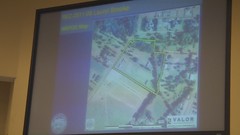
Yes, let’s celebrate Hannah Solar and this solar array!
But why do people have to keep gilding the lily and
claiming it’s the largest in the state when
it wasn’t even back at groundbreaking?
So if Valdosta Mayor John Fretti and County Commissioner Crawford Powell have agreed to expand this solar array
if somebody leapfrogs it, time to get cracking!
It was already leapfrogged before it was built.
After lauding his class of Leadership Lowndes over others,
Mayor Fretti complimented various local organizations and said:
…not only that it has a good quality of life,
it has the infrastructure that is needed for industrial recruitment,
but that you will be successful when you locate in Valdosta-Lowndes County,
and I think Hannah Solar is evidence of that.
All true, and note which comes first: “a good quality of life.”
Mayor Fretti quoted the first law of thermodynamics
(conservation and conservation of energy) and remarked:
But now we have some energy sources in our area that we can take advantage of.
Unfortunately we don’t have an ocean for tidal power.
Unfortunately we don’t have geothermal as much as other areas of the country.
We do have sunlight.
Certainly not as much as some areas of the country,
but we have an abundance enough that we could put out
what is currently the largest array in the state of Georgia.
That’s all good stuff, except this wasn’t the biggest solar array
in the state even
the last time Mayor Fretti stood on the same spot and said the same thing.
Maybe he (and everyone) should double-check what VLCIA tells him.
Brad Lofton knew
Continue reading →
 He may be gone, but he’s still up to his old tricks, and he’s using us for a reference.
He may be gone, but he’s still up to his old tricks, and he’s using us for a reference.









